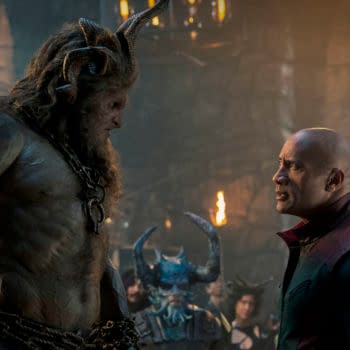Posted in: MLB, Sports | Tagged: 1927 yankees, babe ruth, boston red sox, bryce harper, cal ripken jr., cleveland indians, columbia, eleanor gehrig, HRL, lou gehrig, MLB, murderer's row, new york yankees, pride of the yankees, stamp, triple crown, washington nationals, wheaties, world series, yankee stadium
Know Your Baseball: Lou Gehrig, American Treasure
Hating the Yankees is as American as apple pie, paying taxes, and fireworks on July 4th. I am a Cleveland Indians fan, who dabbles in Boston Red Sox and Washington Nationals fandom (I am obsessed with Bryce Harper, who not only may be the games best player, but has the most celebrated hair in baseball). I despise the Yankees. But there is no denying the allure of the pinstripes.
There is no more celebrated team in sports, and as much as it pains me to say it: it's deserved. To know baseball is to know more than you would ever want to about them damn Yanks. Today, on an important day in baseball history, we will take a look at the life of one of baseball's all-time greats, Lou Gehrig.
Gehrig was part of the fabled Murderer's Row in the late 1920s, winning six World Championships. He played First Base for the Yankees all 13 of his Major League seasons, from 1926-1939. His list of accomplishments on the field:
- 7-time All-Star
- 2-time MVP
- Triple Crown Winner ((1934)
- AL Battling Title in 1934
- 3-time AL Home Run leader (1931, 1934, and 1936)
- AL RBI leader (1927, 1928, 1930, 1931, 1934)
- Hit 4 Home Runs in a single game (June 3, 1942)
- Played in 2,130 games in a row ( a record that stood until Cal Ripken Jr. broke it in 1995)
- Career Totals: 2,721 hits, 493 Home Runs, 1,995 RBI, and a career batting average of .340
Born to German immigrants on June 13th, 1903, Gehrig had a rough childhood. His father was always flirting with unemployment due to a battle with alcoholism, and his mother was a maid, so the family was not well off. He had three siblings, but all three died at early ages: one sister from whooping cough, one from measles, and a brother who died in infancy.
His ability was first noticed at a game in Cubs Park (now known as Wrigley Field), in 1920, where he wowed the crowd by hitting a grand slam completely out of the park at the age of 17. Initially attending the University of Columbia on a football scholarship and pursuing an engineering degree, he lost a year of eligibility when it was discovered he was playing baseball under an alias. Eventually, he joined the Columbia baseball team and played first base and pitcher.
On April 30th, 1923 he officially signed with the New York Yankees. He made his debut on June 15th of that year. He played off and on, mostly as a pinch hitter for a couple years, and was even left off the World Series roster in 1923.
After a breakout season in 1926, in 1927 he produced one of the greatest batting seasons in baseball history, posting 218 hits: 52 doubles, 18 triples, 47 home runs, and 175 RBIs (then a record), while hitting .373. He was named MVP, and the team won the World Series easily. His season was overshadowed, however, by the dominance of the team as a whole and his teammate Babe Ruth, who hit a then record 60 home runs. The pair would anchor the team for years together.
In 1933, he married Eleanor Twitchell, the daughter of of Chicago Parks commissioner Frank Twitchell. The two were crazy about each other, although they never had children. She always pushed him to try new things, including auditioning for the role of Tarzan in a film. There is a famous (and embarrassing) photo of him in a leopard-spotted costume. When Edgar Rice Burroughs saw the photo, he sent him a telegram that read "I want to congratulate you on being a swell first baseman." He would make one appearance in a film, as himself in Rawhide.
On June 1st, 1925 Gehrig entered a game as a pinch hitter. The next day he replaced regular first baseman Wally Pipp, who had been slumping very badly. He would never look back, and despite many injuries, would play in 2,130 straight games without taking a day off. X-rays revealed later in life that he had multiple fractures that healed naturally over time while he kept playing. The team even postponed a game due to rain once when he was feeling under the weather to keep the streak intact. The record would stand for 56 years before being broken by Baltimore Orioles short stop/third baseman Cal Ripken Jr. on September 6th, 1995. Ripken would finish his streak at 2,632 straight games.
Towards the middle of the 1938 season, his appearance began to change and he claimed to be tired out. When the Yankees began spring training in 1939, he showed up as a shell of himself, losing almost all strength in his swing and even passing out on the field. His coordination and speed had also deteriorated. He began the season hitting only .148, and after playing in a hitless game on April 30th, 1939 benched himself.
On May 2nd, as the Yankee captain (the highest honor you can have as a member of the team; the Yankees have only had 15 in their entire history), he walked a line-up card to the stunned homeplate umpire. A PA announcement went out in Tiger Stadium in Detroit announcing that for the first time in 2,130 games, Lou Gehrig would not be at first base for the Yankees, and the entire stadium gave him a standing ovation while he cried in the dugout.
He would never play in another game.
On his birthday, June 19th, 1939, Gehrig was diagnosed with amyotrophic lateral sclerosis, or ALS. Now commonly referred to as Lou Gehrigs Disease, it attacks the muscles and causes the death of voluntary muscles in the body. The doctors gave him three years to live. The Yankees announced his retirement on June 21st, 1939. Fans and baseball itself cried out for a time to honor the man, and they got their chance.
Which leads us to July 4th, 1939. Between a double-header, the crowd of 61,808 fans and the Yankee organization honored Gehrig. Former teammates from the Murderer's Row 1927 team came back, many people gave him trophies and plaques, many of which he had to place on the ground because he no longer had the strength to hold them. Speeches were made by various people, the most poignant and moving one from his long-time manager Joe McCarthy:
"Lou, what else can I say except that it was a sad day in the life of everybody who knew you when you came into my hotel room that day in Detroit and told me you were quitting as a ballplayer because you felt yourself a hindrance to the team. My God, man, you were never that."
The players even gave him a trophy inscribed on the front with the following poem, written by New York Times writer John Kieran:
"We've been to the wars together;
We took our foes as they came;
And always you were the leader,
And ever you played the game.Idol of cheering millions,
Records are yours by sheaves;
Iron of frame they hailed you
Decked you with laurel leaves.But higher than that we hold you,
We who have known you best;
Knowing the way you came through
Every human test.Let this be a silent token
Of lasting Friendship's gleam,
And all that we've left unspoken;
Your Pals of the Yankees Team."
The trophy is reported to have only cost about $5, but was considered by Gehrig to be one of his most prized possessions. It is now on display at the Baseball Hall of Fame.
It was then that he walked up to the mic and delivered what is still considered to be the most iconic speech in all of sports history. No known footage of the full speech exists, but here is a snippet followed by a transcription:
"Fans, for the past two weeks, you've been reading about a bad break. Today, I consider myself the luckiest man on the face of the earth. I have been in ballparks for seventeen years and have never received anything but kindness and encouragement from you fans.
"When you look around, wouldn't you consider it a privilege to associate yourself with such fine-looking men as are standing in uniform in this ballpark today? Sure, I'm lucky. Who wouldn't consider it an honor to have known Jacob Ruppert? Also, the builder of baseball's greatest empire, Ed Barrow? To have spent six years with that wonderful little fellow, Miller Huggins? Then to have spent the next nine years with that outstanding leader, that smart student of psychology, the best manager in baseball today, Joe McCarthy? Sure, I'm lucky.
"When the New York Giants, a team you would give your right arm to beat, and vice versa, sends you a gift – that's something. When everybody down to the groundskeepers and those boys in white coats remember you with trophies – that's something. When you have a wonderful mother-in-law who takes sides with you in squabbles with her own daughter – that's something. When you have a father and a mother who work all their lives so you can have an education and build your body – it's a blessing. When you have a wife who has been a tower of strength and shown more courage than you dreamed existed – that's the finest I know.
"So I close in saying that I might have been given a bad break, but I've got an awful lot to live for. Thank you."
The crowd stood and cheered for two straight minutes, chanting "We Love You, Lou" as he walked away from the mic an emotional wreck. Babe Ruth embraced him. That day, he became the very first player for any team to have his number (4) retired.
On December 7th, 1939, he was elected to the Hall of Fame in a special election due to his illness. In October of 1939, he was appointed a New York City Parole Commissioner. He would quietly do the job, asking that his duties and visits go unreported in the press when he went to correctional facilities. His wife Eleanor would often help him perform the job, even guiding his hand to help sign documents. He would resign in May 1941.
Henry Louis Gehrig passed away on June 2nd, 1941 at his home in the Bronx suburb of Riverdale. He was survived by his wife Eleanor, who would never remarry and was quoted as saying "I had the best of it. I would not have traded two minutes of my life with that man for 40 years with another." She passed away in 1984, after dedicating the rest of her life to ALS research.
Throughout the years, his life has been immortalized in film twice: the film Pride of the Yankees and a television movie titled A Love Affair: The Eleanor and Lou Gehrig Story. The US Postal Service gave him a 25 cent stamp on the 50th anniversary of his retirement. He was also the first athlete to appear on a box of Wheaties. He was voted first baseman on the MLB All-Century team, as well.
Gehrig was exactly what an athlete should be: an upstanding citizen, who played the game with class and dignity, carried himself the same way on the field as off, took time for the fans, and above all, had fun. No matter what life threw at him, he quietly and diligently went about his business and never took anything for granted. While you watch the games on this July 4th, remember and honor this man who, while his career was cut short, truly is the greatest player in the history of baseball.
To learn more about ALS or to donate, go here.





















